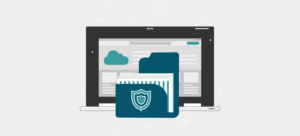
In the realm of cloud security, Bring Your Own Key (BYOK) has become a buzzword, hailed as the shining knight in the armor of data protection. But is it truly the hero it’s made out to be? This notion has been perpetuated by respected organizations like the Cloud Security Alliance (CSA) and the National Institute of Standards and Technology (NIST), which endorse BYOK to fortify data security and mitigate risks when collaborating with cloud providers. However, does BYOK truly represent the optimal approach for safeguarding your backup data in the cloud?
This post breaks down how BYOK is used today, presents its challenges and limitations and highlights the advantages of alternate approaches that streamline key management while bolstering data security.
What is BYOK?
Bring Your Own Key (BYOK) is a cryptographic model that empowers organizations to generate and control their encryption keys, particularly in cloud computing environments. It allows organizations to take ownership of the key generation process and later transfer these keys to a cloud service provider (CSP). Once in the CSP’s environment, these keys can be utilized by customer applications.
The most common use case for BYOK is in cloud computing environments. Organizations leverage BYOK when they want to maintain control over encryption keys while benefiting from the services offered by CSPs. This approach is particularly valuable when regulatory compliance and data portability are top priorities.
Advantages of BYOK
BYOK touts several advantages, including:
- Enhanced control: Organizations have full control over the key generation process, ensuring key security.
- Data protection: It allows organizations to protect their data with keys they generate and manage.
- Regulatory compliance: BYOK can help meet regulatory requirements by enabling organizations to control their encryption keys.
- Data portability: Users can securely move their data between different cloud providers without exposing sensitive keys.
Does BYOK truly provide complete control over data?
While BYOK promises complete control over encryption keys, the extent of control can vary depending on the cloud service provider (CSP) and the specific implementation. Organizations should consider that some CSPs may retain certain controls over key management, which could impact the level of control they have.
Does BYOK solve the problem of key control when using a cloud service provider?
The straightforward answer is no. BYOK may create a sense of control but, in reality, it only covers the key generation process. After the key is copied or transferred to the CSP’s KMS, the customer no longer has full control over it. This is especially true for Cloud KMS solutions that are fully managed and controlled by the CSP. As cryptomathic.com stated, “Essentially BYOK forfeits control of its encryption keys once they are uploaded to the cloud provider.”
In fact, if key control is the sole reason for implementing BYOK, it may not be the best choice. BYOK comes with additional implementation costs and complexities. An alternative, such as generating keys directly in the CSP’s KMS, can be more secure and straightforward.
How does BYOK address compliance requirements?
Contrary to popular belief, BYOK may not directly address compliance requirements related to key control. While it may offer key control to a certain extent, it’s not a specific compliance solution. Compliance documents, such as The European Banking Authority (EBA) guidelines, do not explicitly mandate BYOK as a key control method.
The EBA guidelines do mandate having control over cryptographic keys, but they do not specify the exact method (like BYOK) to be used. Therefore, it’s up to the individual financial institutions to choose the key management method that best fits their risk management framework and meets the EBA’s requirement for control over cryptographic keys.
When does BYOK bring value?
BYOK can be valuable in the following scenarios:
- Key escrow: When key escrow is needed for key recovery or legislative reasons.
- Migrating applications: When migrating applications to a CSP, the same key must be used for compatibility.
- Multi-cloud deployment: When applications need to be deployed across multiple CSPs and require consistent key usage.
Common challenges with adopting BYOK
The adoption of BYOK comes with several challenges, including:
- Key management complexity: Users assume the responsibility of generating, storing, and safeguarding their encryption keys, which can be complex and resource- As stated by Cloud Security Alliance, “The problem with this form of key management is that organizations lack sole control and ownership over the keys, resulting in confidentiality risks and failure to meet compliance or internal security requirements.”
- Risk of key loss: Users must be diligent in protecting their encryption keys to prevent potential loss, theft, or compromise.
- Compatibility issues: BYOK may not be supported by all cloud service providers, limiting the scope of its application.
- Additional cost: BYOK services often require a premium service tier that charges extra fees for using hardware security modules (HSMs) to store your keys. You also need to invest more time and resources to manage your own keys, such as creating, storing, transferring, monitoring and rotating them.
Risks and administrative burdens associated with BYOK
BYOK has been known to add administrative burdens and increase risk. Some examples of this have been administrators losing, revoking, modifying or having their keys tampered with. These challenges can have a profound impact on an organization’s stability and resiliency.
However, it’s important to note that despite these complexities, the control and management of key lifecycle processes do not entirely revert back to the enterprise. As stated by Cloud Security Alliance, “In the end, all other key management lifecycle processes are taken back to the CSP, meaning that the BYOK deployment has not brought control and management back to the enterprise despite the added complexity.”
This highlights that while BYOK may seem to offer more control to the enterprise, it also introduces additional complexities without necessarily providing full control and management of key lifecycle processes.
Does BYOK protect data from account compromise?
BYOK alone does not protect data from account compromise. If an attacker or state authority gains access to the customer’s account, they can access the data with the customer-supplied key, which is online and available to the service provider.
Does BYOK play a role in data encryption?
The customer-supplied key in a BYOK setup is not used to encrypt the actual data but to encrypt another key generated by the service provider. It does not directly impact the day-to-day encryption of data.
Does BYOK prevent access to backup data?
Contrary to some assumptions, BYOK does not inherently prevent access to backup data, as the provider typically maintains its own copies of the keys, and the customer may not have full control over access.

Accelerate Active Directory recovery
Does BYOK protect data from service provider compromise?
If the service provider is compromised or seized by authorities, the customer-supplied key is also exposed, as it is stored and used by the service provider. The customer may have limited control in such scenarios.
Alternatives to BYOK
A robust alternative to BYOK is to leverage a cloud backup and recovery solution that integrates a secure and scalable key management service like Azure Key Vault. Azure Key Vault is a service equipped with encryption, auditing and compliance features for efficient key management. It seamlessly integrates with other Azure services while adhering to internationally recognized standards.
By leveraging solutions that rely on Azure Key Vault, organizations have been known to enjoy the following benefits.
- Simplicity: Organizations can be relieved of the burden of generating and managing their encryption keys, as Azure Key Vault automates this process. Customers only need to provide consent to the backup and recovery solution for data access.
- Flexibility: Organizations retain the ability to revoke consent, delete data or terminate subscriptions at their discretion. They can also perform granular data restoration and compare backups with live data to identify changes or deletions.
- Robustness: Azure Key Vault ensures data protection at every stage of its journey, encrypting data both in transit and at rest using keys stored in a FIPS-2 level validated Hardware Service Module. With hourly key rotation and robust auditing and monitoring capabilities, data security is reinforced.
- Peace of mind: Organizations can have confidence that their data security and their compliance align with the highest standards. Neither the employees of the backup and recovery solution nor Microsoft have access to or visibility of the encryption and decryption keys, as these operations are handled seamlessly between Azure Key Vault Service and Azure Storage Tables.
Conclusion
The allure of Bring Your Own Key (BYOK) may be enticing due to the perceived control it offers, but it also presents significant challenges and risks to organizations aiming to secure their cloud-based backup data. A superior approach for many is to leverage a cloud backup and recovery solution that streamlines key management while enhancing data security through Azure Key Vault. By doing so, organizations can safeguard their cloud-based identity and enterprise applications and minimize downtime.



